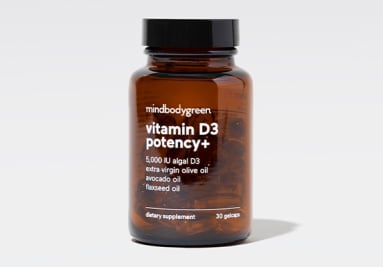Is Your Vitamin D Supplement Sustainable? A PhD Nutrition Scientist Explains


Do you know where the vitamin D in your go-to supplement comes from? Though nourishing your body in a sustainable way often starts with rethinking the food on your plate, paying more attention to the ingredients in the supplements you take is a natural next step.
After all, the nutrients and bioactives in your go-to products come from somewhere—and many of the popular supplements you'll find on store shelves don't exactly formulate with sustainability as a top priority (or consider it at all).
Advertisement
How vitamin D supplements are typically made.
The average vitamin D3 supplement (i.e., cholecalciferol, the form known to best improve vitamin D levels in the body)* is made from lanolin. A common ingredient (aka raw material) in a number of health and beauty products, lanolin is a yellow fat that comes from sheep's wool1 that is UV irradiated to create a concentrated cholecalciferol source.
Though lanolin is a perfectly acceptable and quality source of the vitamin D3 found in supplements and doesn't pose any significant safety concerns, according to the Environmental Working Group (EWG), it does come from an animal product (i.e., shearing of wool). So, if that's something you're trying to cut down on as a part of your plant-based diet or personal approach to sustainability, you might be interested in a plant source of vitamin D when supplementing.
Traditionally, though, plant-based vitamin D supplements were only made from either irradiated yeast or mushrooms and only offered vitamin D2, which is a less than ideal supplement solution. Why? Ashley Jordan Ferira, Ph.D., RDN, mbg's VP of scientific affairs, explains: "The totality of clinical science clearly demonstrates that vitamin D2, ergocalciferol, is two to three times less effective than D3, cholecalciferol, at raising and maintaining vitamin D levels in the body. The science is lucid and compelling.*"
Advertisement
Do plant-based vitamin D3 supplements exist?
Luckily, there are plant sources of D3 out there. The ideal option, according to Ferira, is algae. "Organic algal-sourced vitamin D3 is the cream of the crop for vitamin D," says Ferira.
Though harder to find, algal-sourced vitamin D3 can make for a supplement that's both sourced from plants and more sustainable.
VegD3®, for example, is a non-GMO, USDA organic, plant-origin, environmentally sustainable algal vitamin D3 option that's chemically identical to the D3 you'd get from the usual animal-based lanolin. The process of creating this algae-based vitamin D3 is also free of pesticides (something that can't always be guaranteed for sheep-based options), according to the brand.
Since plant-based supplemental sources of vitamin D have traditionally offered vitamin D2, VegD3® offers a unique source that's both sustainable and the form of D the body prefers and needs daily (aka, this is an essential-fat-soluble micronutrient you must consume because your body can't synthesize it).
In fact, VegD3® is a premium algal D3 ingredient that is produced "at a U.K.-based research center using advanced technology that has zero negative impact on the local environment," Ferira says.
This is a big deal considering that the other plant-derived option for vitamin D3 comes from lichen, which takes many years (to decades) to grow and then has to be removed from its natural ecosystem for the vitamin D to be extracted, adds Ferira. "Plus there are animals that were relying on this lichen for their nourishment. It's now gone," Ferira says.
Not to mention, the lichen that D is pulled from may be contaminated—and the concentration of D3 you can ultimately end up with can vary significantly based on the type of lichen harvested and the season it's harvested in, she says.
All of these factors make it a far less ideal plant source of vitamin D3 for supplements than a high-quality algae—particularly VegD3®, which is produced without contamination concerns or taking a toll on the environment.
Finding a sustainable vitamin D3 supplement.
To get a sense of how sustainable your vitamin D supplement is, you'll have to turn the bottle around and take a close look at the label. "Look at the Supplement Facts panel box and the product page for details on your vitamin D3 ingredient source. Lanolin is a quality animal-derived source, but if you're seeking a plant-derived, sustainable option, organic algae is where it's at," Ferira concludes.
On the back of a bottle of mbg's vitamin D3 potency+, for example, you'll see vitamin D clearly listed as "vitamin D (as VegD3® organic vegan algal cholecalciferol)," which lets you know that you can feel good about the source and environmental impact (or lack thereof!) of your supplement routine.
In fact, one of our biggest inspirations for creating our own vitamin D product was to give wellness warriors a supplement option that not only offers an effective amount of D3 (5,000 IU) for vitamin D sufficiency but also comes from a source that we can all feel good about as we try to minimize our environmental footprint.* Now, how's that for the full package?

Lauren Del Turco, CPT is a freelance health and wellness writer, editor, and content strategist who covers everything from nutrition to mental health to spirituality. Del Turco is also an ACE-certified personal trainer. She graduated from The College of New Jersey with a Bachelor of Arts in English and Creative Writing. When she’s not on deadline, you’ll find Del Turco hiking with her dogs, experimenting with new plant-based recipes, or curled up with a book and tea.

